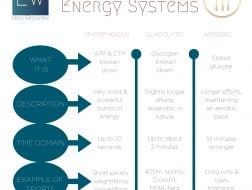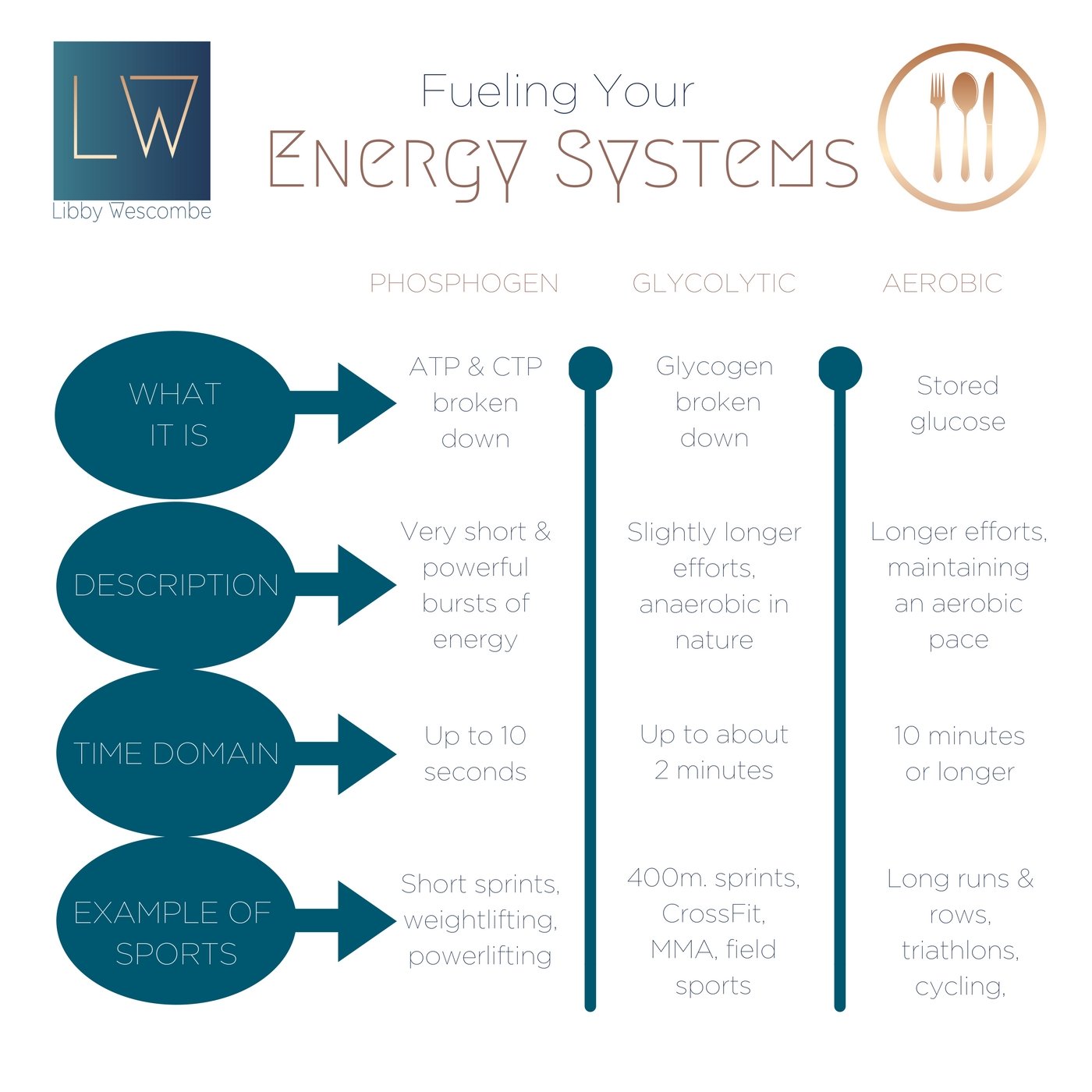Fuelling your energy systems for performance

Different types of exercise will put demands on different energy systems of the body. As an athlete, knowing how to best fuel your body and how to time your nutrition can have massive implications on the quality of your training and your recovery. Which type of athlete are you? What sort of energy system does your sport rely on? Your training/sport may cross over between different systems. Example: CrossFitters.
Find the category that describes your training most of the time. You may spend most of your training relying on the phosphogen system, though sometimes you may do some metabolic conditioning, which relies on the glycolytic system. The graph demonstrates how the energy systems overlap based on time domain.
Soooo what does all of this mean for you?
It means that what you eat to fuel yourself before and after—and possibly during—a workout matters. If you want to start performing better, not only is the quality of your nutrition important, but knowing macronutrients to use for fuel and when you eat them is, too.
When I do personalised meal plans for my clients who are athletes I base their program around their training for performance purposes. Even if you aren’t an athlete, learning the basics of what to eat around your training is useful and worth learning about.
Stay tuned for part 2, in which I will explain some examples of what foods/macronutrients to eat to fuel what energy system you’re working depending on your training type/sport.
Strength & Power Athletes: Powerlifters. Olympic lifters. 100m sprinters, high jump/long jump etc:
You’re in a special group because the primary fuel for your training is ATP / ATP + creatine dependent; consequently, you aren’t ripping through glycogen like a high-intensity or endurance athlete would. Takeaway: You may be able to play with cycling your carbs on recovery days and on easier days...but be sensible & don’t go lower-carb on the days you do your hardest efforts. Best to save that for easier days or rest days. Perhaps the simplest way to do it is to consume more carbs on high-effort days and fewer carbs on low-effort days. You need do higher protein though—perhaps even more than 2g per kg of bodyweight per day if you’re trying to gain strength/mass. Taking BCAAs during your training sessions may help with muscle building too.
High intensity athletes: CrossFitters, MMA fighters, footballers etc.
If you’re spending most of your time in relatively short but glycogen-dependent efforts, this is you. Let’s sum this up right now: Eat carbs. Eat most of your carbs Post-WO, but also throughout the day. If you restrict carbs all the time, you’re likely to see decreased performance and worsening of body composition. Remember our friend cortisol? You’ll end up jacking it up even more—and trust me, you get enough of a cortisol bump from the intensity of your training and other stress. Some folks advocate taking IntraWO nutrition, but seriously, who the hell has time to stop and swig on BCAAs mid interval? You just don’t need it. Top off protein and carbs Post WO and you’ll be fine. Protein for muscle protein synthesis, and carbs to replenish glycogen for high-intensity athletes. Carb cycling can get tricky as you need topped-up glycogen for your next training session. Although you can go lower carb on your rest days but just not too close to your next training session.
Endurance athletes: Distance runners. Cyclists. Triathletes etc
If your training or competition lasts an hour or more, you need specific nutrition to cover the time periods and metabolic changes your body’s going through. You differ most from the power/strength and high-intensity athletes in that you’ll probably need to fuel during your training. For shorter efforts (less than 60 minutes) pick quick digesting carbs + water or water with electrolytes. For longer efforts (60-minutes +) pick slower digesting starchy carbs + water with electrolytes. As well as that, seeing as your body is burning fat for fuel consider adding a readily digested fat like MCT (medium chain triglycerides). After an hour, your body will start breaking down muscle protein for fuel so supplying protein is important as well. Hydration is critical for endurance athletes, and I recommend an electrolyte replacement for 60min + efforts. Post workout you need protein for muscle protein synthesis and carbs to help replenish glycogen. Carb cycling is optional but be sure your glycogen is topped up before your next effort.
Join the other 10,000+ who get my best fitness, diet & mindset tips.



Comments